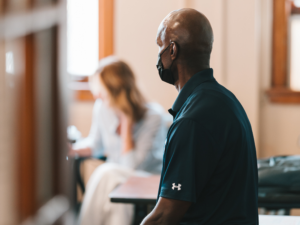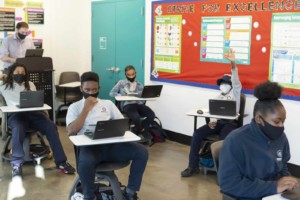A Parent's Voice: "Good Enough" Is Not Good Enough
Janet Keller is an Arkansas parent of a student who attends Central Falls High School in Little Rock
“Good enough” is a term that is appropriate for drying after-dinner dishes, playing a leisurely game of golf or half-heartedly watching an early evening sitcom. “Good enough,” however, should be avoided in the area of education in general, and Arkansas education, in particular.
Arkansas is a small state with about 2.6 million residents, of whom 465,000 are enrolled in Pre-K through 12th grade education. Roughly 54% of Arkansas students are eligible for free or reduced lunches. With 75 counties in the economically-challenged State, one would think it prudent to limit the number of school districts and consolidate the resources so that as many dollars as possible fund actual student education. That’s what prosperous businesses and corporate leaders do – but it is not happening in Arkansas.
The Arkansas Policy Foundation in a 1998 study recommended restructuring the 310 Arkansas school districts for K-12 into 134 administrative units. Arkansas now has 244 districts statewide with an average of 1,906 students per district.
With so many of the limited dollars being used to fund administrators, Arkansas students are left to compete in the global marketplace with only a “good enough” education. There is one solution that will give students an equal playing field in our country and the worldwide arena: virtual education. Funding 244 school superintendents, their staff members, buildings, etc. in a poor state where education is only “good enough” can be changed with the use of digital learning techniques and by opening up virtual charter school education to more people.
Arkansas currently has a K-8 virtual school for 500 students. The cap of 500 makes sure only a limited number of students receive this incredible education. Because of current legislation, there is a waiting list of nearly 1,000 students – Arkansas State law prohibits more students from participating in this futuristic trend that gives students equal footing with the international student community.
Virtual schools are about providing excellent education to students with a variety of situations, not just to students who are desperate to pick up a few credit hours. These are the positive attributes of a virtual high school:
1. World-class education at our children’s fingertips 24/7.
2. Access to top-notch teachers who are available 24/7 to assist the student.
3. Curriculum tailored to the student’s best learning skills.
4. Accessibility during student’s learning time of day or week.
5. Flexibility to complete coursework at one’s own pace.
6. Higher test scores than average high schools.
7. Ability to communicate on-line with student peers around the globe.
8. Coursework that is challenging, current, and supportive of the student’s goals.
9. Quality time with family and friends in an environment conducive to learning.
10. Curriculum that allows students “in the desert” to be “at the ocean” without leaving their desk.
This does not need to sound too good to be true.
Virtual schools provide a solution to level the playing field for our students in the global marketplace. Arkansas’s economy will reap the benefits of virtual schools if funds are redirected and more emphasis is placed on the customers, i.e. our children and students. It’s time for Arkansas to put “Good enough” education on the shelf and go for “Great” education!







0 Comments
Leave a Comment
Your email address will not be published. All fields are required.